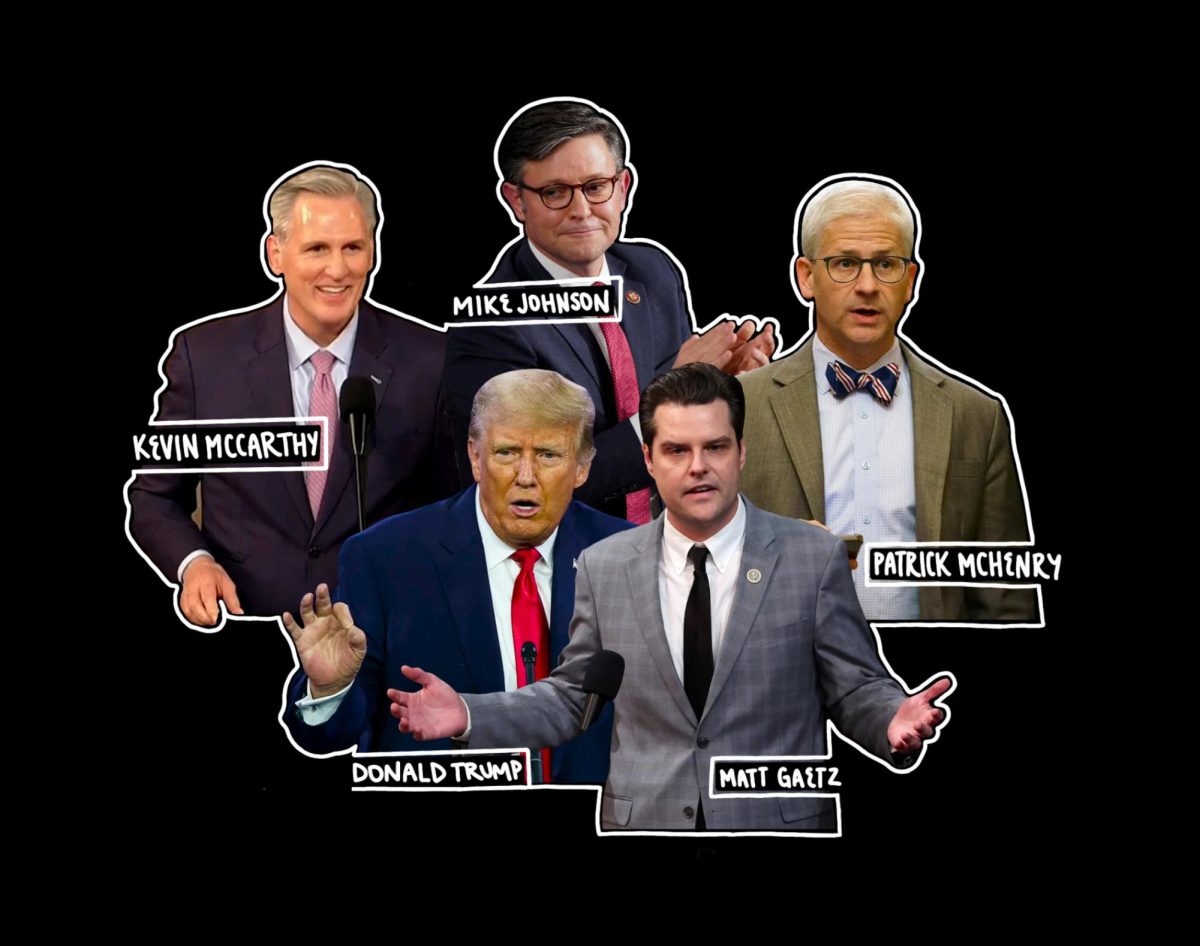In a 216-210 vote on Oct 3, the House of Representatives (HOR) ousted Speaker of the House Kevin McCarthy, a motion that has never before occurred in America’s government. On top of it all, the warring parties—Democrats and Republicans—couldn’t seem to come to a consensus long enough to unite and vote. Suddenly Congress is frozen, the HOR is pitted against each other, and everyone is freaking out.
The last straw came in May, when McCarthy struck a deal with Democrats to raise the debt ceiling, an act to avoid economic chaos in America. Florida Rep. Matt Gaetz proposed the removal of McCarthy as speaker, feeling threatened that the Republican Speaker was willing to work with the Democrats. Led by Gaetz, a group of far-right Republicans were able to remove their speaker, leaving the position empty. McCarthy has claimed that his removal was entirely personal, having nothing to do with money.
“It seems ridiculous and almost infantile that our government is being completely halted in a time that we very specifically need it because of lines drawn in the sand between parties,” said Summit senior and government aficionado Connor Richards. Without its speaker, the House is very limited in what progress it can make.
Generally, the speaker is responsible for administering the oath for new representatives, allowing members to speak on the House floor, counting and declaring all votes, appointing members and sending bills to committees and signing bills and resolutions that pass in the House. Clearly, this position cannot go unfilled. Summit social studies teacher Patrick Kilty explained that there was a list of representatives that would fill in temporarily for the speaker in case of a vacancy, and McHenry was first on that list.
“[Patrick McHenry] was the first person on the list when Kevin McCarthy got the boot, so he got elevated pro tem (for the time being), and the only thing that he could do, according to house rules, is set up to vote to find another speaker,” said Kilty.
After four rounds of voting, the HOR was finally able to come to an agreement on who would be the next speaker on Oct. 25, with Louisiana’s Republican representative Mike Johnson earning a majority vote of 220. All of this tension…to replace one Republican speaker with another? What was the goal?
“The people on the far right of the Republican conference got what they wanted because Mike Johnson is a far right, big time backer of Donald Trump, big time election denier, big time conservative right-wing Christian,” explained Kilty. “He is exactly what the people that went after McCarthy wanted.”
As described in an article by the New York Times, Johnson has historically backed abortion bans, disapproved of queer marriage and relations, sponsored legislation to ban discussion of sexual orientation and gender identity at institutions involving children under ten and served on Trump’s impeachment defense team.
It remains to be seen how the replacement of McCarthy with Johnson will change our legislation.
While the House has officially replaced its speaker and is returning to its regular duties, the voting process wasn’t nearly quick enough to soothe public anxieties.
Citizens and politicians alike rushed to find a shiny new speaker nominee, throwing out several names whether the individuals were from inside the HOR or not. Amidst the chaos, Donald Trump was yet again pulled into the spotlight.
“I called him and I said, ‘Sir, I’m nominating you for the speaker of the House,’” said Texas Rep. Troy Nehls in an interview for Politico. “I said, ‘I think that you would do a great job fixing the brokenness we see in the Congress.’”
Trump’s sudden interest in the race for speaker of the House sparked several questions regarding the position’s qualifications: Can an individual outside the house run for speaker? How does that even work?
The procedures in place to elect a new speaker begin with a nomination and end with a majority vote, as highlighted by a PBS article.
Technically, any U.S. citizen (non-felons over 25) can run. That doesn’t mean they should. There’s a reason that all previous speakers have been elected directly from the House. Understanding the inner workings of the House isn’t something you can learn overnight.
“To be in that sort of position you need to have experience in the House,” said Richards, explaining that it was too risky to allow a newcomer in such a powerful spot.
Beyond experience, the HOR was created with republicanism in mind. That’s to say, the power of our legislature starts in the hands of the people when they elect representatives to the House.
By allowing an individual from outside the House to run as speaker, the voice of citizens is directly overruled and overpowered. In order to uphold the democratic ideals America wants so desperately to embody, representatives must start at the bottom rung and climb their way up, first getting elected as a city official, then district, then state. The only reason someone should ever make it into the HOR is because the people of their state truly support them and want that individual to be their voice.
“[Speaker of the House] is an unelected official,” explained Kilty. “If you’re not elected, that means you’re not chosen by the people.”
By failing to create strict requirements for speaker of the House, the founding fathers have created a loophole, essentially allowing people to skip steps and gain power in the national government. This idea is increasingly concerning because of just how much power the position holds.
“Arguably the most powerful person in all of congress is the speaker of the House. They basically can make decisions on anything they want and it’s final. Legislation can’t get passed unless there’s a speaker doing it,” described Kilty. Beyond this, after the vice president, the speaker is next in line for the presidency. “To put somebody, theoretically, who’s not elected by the American people into that position… that’s dangerous.”
It is ridiculous to believe our government would be in good hands without requiring the politicians that represent us to do so the right way. Cutting corners–like nominating an outsider to be speaker–only leads to hastily assigned positions, and will leave the national government with more weak spots and corruption than already exists.
































